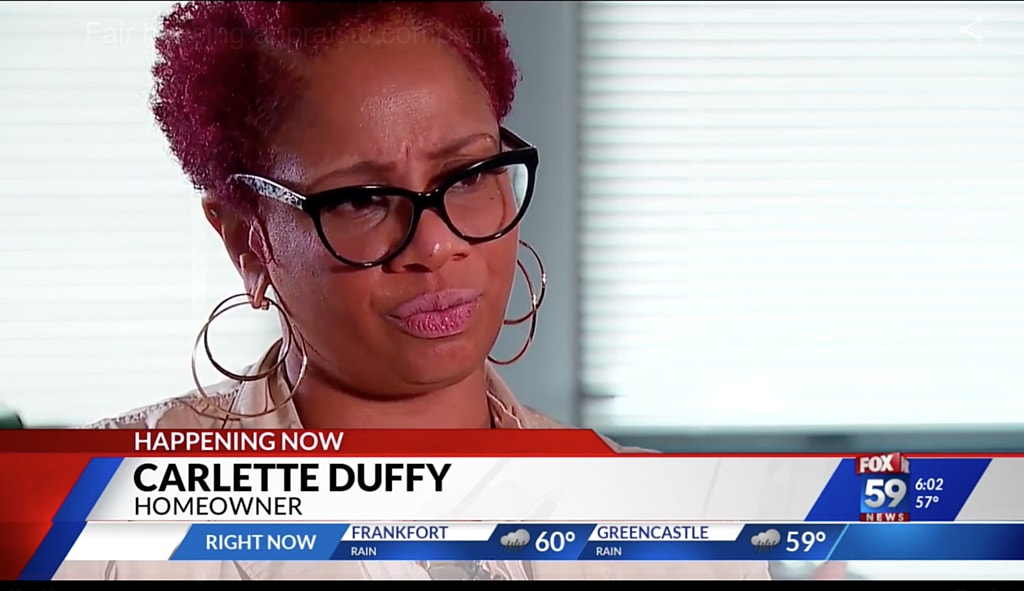An Indianapolis Black woman is calling out discrimination in the real estate industry.
Carlette Duffy, who lives in a historically Black neighborhood, was confused when she had her home appraised twice, and the figure came back below or what she paid for the house in 2017. So she made slight changes to her home and had a white male friend sit in for her, and the home’s value reached over $100,000, per Fox 59.
With help from the Fair Housing Center of Central Indiana, she filed a complaint with the U.S. Department of Housing and Urban Development.
“When I challenged it, it came back that the appraiser said they’re not changing it,” said Duffy.
Read More: Why Black women aren’t getting elected to statewide and executive positions
The homeowner’s goal was to refinance her home to use the equity to purchase her grandparents’ house. When the odd appraisal figures came back, she knew exactly what she needed to do. She had recently read about a similar situation in a New York Times article.
“I decided to do exactly what was done in the article,” said Duffy. “I took down every photo of my family from my house… I took every piece of ethnic artwork out, so any African artwork, I took it out. I displayed my degrees, I removed certain books.”
After applying the new strategy and asking her white male friend to sit in for her new appraisal, the figure came back almost double.
“I get choked up even thinking about it now because I was so excited and so happy, and then I was so angry that I had to go through all of that just to be treated fairly,” she said.
Duffy was able to purchase her grandparents’ home and said she is happy she spoke up. However, the homeowner and the FHCCI are requesting the U.S. Department of Housing and Urban Development look into the discrimination.
Read More: Warner Bros., DC to select Black director for Black Superman movie
“Whether or not those comps were fairly selected is something that is the basis of the complaints that we have filed,” said FHCCI Executive Director Amy Nelson.
The article Duffy read was about the discrimination Abena and Alex Horton experienced in Jacksonville, Fla. Similar to Duffy, the couple was affected by the low home-refinance rates due to the pandemic.
Their home was appraised for nearly $100,000 less than they knew it was worth. Mrs. Horton, who is Black, grew suspicious. She removed Zora Neale Hurston and Toni Morrison books from her home and removed anything that represented the Black experience. Her white husband sat in for the next appraisal, and the home valued at nearly a 40% increase from the first appraisal.
“My heart kind of broke,” said Ms. Horton per The New York Times. “I know what the issue was. And I knew what we needed to do to fix it, because in the Black community, it’s just common knowledge that you take your pictures down when you’re selling the house. But I didn’t think I had to worry about that with an appraisal.”
Like Duffy, she also filed a complaint, but when the Department of Housing and Urban Development got back to her about the case, it was assigned to Jacksonville Human Rights Commission. The agency said it had received numerous similar complaints.

Rodman Schley, the Appraisal Institute president, released this statement:
“When we see even one story of a consumer who feels they were treated differently because of their race, it’s very concerning because that goes against everything we stand for. Appraisers take a lot of pride in being an objective source of real estate value information. We look at the numbers and facts and mirror what the market tells us,” reads the statement by the organization that represents appraisers across the country.
“We have a project team that is going to review research and reports about diversity, equity and inclusion in appraisal. Whether or not we agree with someone’s research methodology, we want to better understand what we might learn or glean from other people’s work.
We are interested in these studies and the researchers’ perspectives, and we want to understand their findings and viewpoints. We also are participating in the Brookings Institution challenge to address systemic racism in the housing market, sitting side by side with those in the greater real estate world and people who are very much outside of the profession.
The more people who can experience economic opportunity, the better off they will be and the better off all our communities will be. We want to help advance policies that enable economic opportunity knowing that care must be taken to avoid unintended consequences from policy changes, such as placing consumers in “upside down” mortgages or fueling housing bubbles,” the statement read.

The statement shared they’re taking the time to educate themselves about “potential bias” and working with members of Congress like House Financial Services Committee Chairwoman Maxine Waters on “how to bolster fair housing programs and develop solutions to mortgage credit problems.”
Schley concluded by mentioning that the Institution has been amplifying internal initiatives to bring about positive change over the last two years. “We recognize that recruiting for greater diversity will make us stronger and more representative of the communities we work in and contribute to greater cultural awareness.”
Have you subscribed to theGrio’s podcast “Dear Culture”? Download our newest episodes now!
TheGrio is now on Apple TV, Amazon Fire, and Roku. Download theGrio today!

